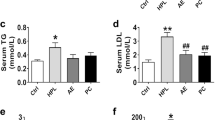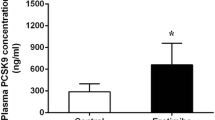Abstract
Objective
To investigate the short- and long-term effects of Xuezhikang (血脂康, XZK), an extract of cholestin, on proprotein convertase subtilisin/kexin type 9 (PCSK9) level.
Methods
Thirty rats were randomly divided into three groups and were given saline, XZK 1,200 mg/kg or lovastatin 10 mg/kg respectively by daily gavage for 3 days (n=10 for each). Sixteen patients without previous lipid-lowering drug treatment for dyslipidemia received XZK 1,200 mg daily for 8 weeks. Fasting blood samples and liver tissue were collected at day 3 for rats, while the blood samples were obtained at baseline and week 8 from patients. The serum PCSK9 and lipid profile were measured. The expression of hepatic low density lipoprotein (LDL) receptor and sterol regulatory element binding protein 2 (SREBP-2) were measured by real time-PCR.
Results
PCSK9 levels in rats were significantly increased in the XZK and lovastatin groups (P=0.002, P=0.003 vs. control) at day 3, while no significant differences were found in the levels of lipid parameters. PCSK9 levels in patients increased by 34% (P=0.006 vs. baseline) accompanied by total cholesterol and LDL-cholesterol decreased by 22% and 28% P=0.001, P=0.002 vs. baseline). The hepatic mRNA levels of LDL-receptor and SREBP-2 were significantly increased in the XZK and lovastatin groups.
Conclusion
XZK has significant impact on PCSK9 in a short- and long-term manner in both rats and humans. Moreover, the data indicated that as lovastatin, XZK increased PCSK9 levels through SREBP-2 pathway.
Similar content being viewed by others
References
Lambert G, Sjouke B, Choque B, Kastelein JJ, Hovingh GK. The PCSK9 decade. J Lipid Res 2012;53:2515–2524.
Ferri N. Proprotein convertase subtilisin/kexin type 9: from the discovery to the development of new therapies for cardiovascular diseases. Scientifica 2012;2012:21.
Zhang DW, Lagace TA, Garuti R, Zhao Z, McDonald M, Horton JD, et al. Binding of proprotein convertase subtilisin/kexin type 9 to epidermal growth factor-like repeat A of low density lipoprotein receptor decreases receptor recycling and increases degradation. J Biol Chem 2007;282:18602–18612.
Bottomley MJ, Cirillo A, Orsatti L, Ruggeri L, Fisher TS, Santoro JC, et al. Structural and biochemical characterization of the wild type PCSK9-EGF(AB) complex and natural familial hypercholesterolemia mutants. J Biol Chem 2009;284:1313–1323.
Lo Surdo P, Bottomley MJ, Calzetta A, Settembre EC, Cirillo A, Pandit S, et al. Mechanistic implications for LDL receptor degradation from the PCSK9/LDLR structure at neutral pH. EMBO Rep 2011;12:1300–1305.
Jeon H, Blacklow SC. Structure and physiologic function of the low-density lipoprotein receptor. Annu Rev Biochem 2005;74:535–562.
Rhainds D, Arsenault BJ, Tardif JC. PCSK9 inhibition and LDL cholesterol lowering: the biology of an attractive therapeutic target and critical review of the latest clinical trials. Clin Lipidol 2012;7:621–640.
Leren TP. Mutations in the PCSK9 gene in Norwegian subjects with autosomal dominant hypercholesterolemia. Clin Genet 2004;65:419–422.
Naoumova RP, Tosi I, Patel D, Neuwirth C, Horswell SD, Marais AD, et al. Severe hypercholesterolemia in four british families with the D374Y mutation in the PCSK9 gene: long-term follow-up and treatment response. Arterioscle Thromb Vasc Biol 2005;25:2654–2660.
Cohen JC, Boerwinkle E, Mosley TH Jr, Hobbs HH. Sequence variations in PCSK9, low LDL, and protection against coronary heart disease. N Engl J Med 2006;354:1264–1272.
Huang CC, Fornage M, Lloyd-Jones DM, Wei GS, Boerwinkle E, Liu K. Longitudinal association of PCSK9 sequence variations with low-density lipoprotein cholesterol levels: The coronary artery risk development in young adults study. Circ Cardiovasc Genet 2009;2:354–361.
Lu Z, Kou W, Du B, Wu Y, Zhao S, Brusco OA, et al. Effect of Xuezhikang, an extract from red yeast Chinese rice, on coronary events in a Chinese population with previous myocardial infarction. Am J Cardiol 2008;101:1689–1693.
Li JJ, Lu ZL, Kou WR, Chen Z, Wu YF, Yu XH, et al. Beneficial impact of Xuezhikang on cardiovascular events and mortality in elderly hypertensive patients with previous myocardial infarction from the China Coronary Secondary Prevention Study (CCSPS). J Clin Pharmacol 2009;49:947–956.
Becker DJ, Gordon RY, Halbert SC, French B, Morris PB, Rader DJ. Red yeast rice for dyslipidemia in statin-intolerant patients: a randomized trial. Ann Intern Med 2009;150:830–839, W147–W149.
Halbert SC, French B, Gordon RY, Farrar JT, Schmitz K, Morris PB, et al. Tolerability of red yeast rice (2,400 mg twice daily) versus pravastatin (20 mg twice daily) in patients with previous statin intolerance. Am J Cardiol 2010;105:198–204.
Careskey HE, Davis RA, Alborn WE, Troutt JS, Cao G, Konrad RJ. Atorvastatin increases human serum levels of proprotein convertase subtilisin/kexin type 9. J Lipid Res 2008;49:394–398.
Awan Z, Seidah NG, MacFadyen JG, Benjannet S, Chasman DI, Ridker PM, et al. Rosuvastatin, proprotein convertase subtilisin/kexin type 9 concentrations, and LDL cholesterol response: the JUPITER trial. Clin Chem 2012;58:183–189.
National Cholesterol Education Program (NCEP) Expert Panel on Detection, Evaluation, and Treatment of High Blood Cholesterol in Adults (Adult Treatment Panel III). Third Report of the National Cholesterol Education Program (NCEP) Expert Panel on Detection, Evaluation, and Treatment of High Blood Cholesterol in Adults (Adult Treatment Panel III) final report. Circulation 2002;106:3143–3421
Welder G, Zineh I, Pacanowski MA, Troutt JS, Cao G, Konrad RJ. High-dose atorvastatin causes a rapid sustained increase in human serum PCSK9 and disrupts its correlation with LDL cholesterol. J Lipid Res 2010;51:2714–2721.
Gouni-Berthold I, Berthold HK, Gylling H, Hallikainen M, Giannakidou E, Stier S, et al. Effects of ezetimibe and/or simvastatin on LDL receptor protein expression and on LDL receptor and HMG-CoA reductase gene expression: A randomized trial in healthy men. Atherosclerosis 2008;198:198–207.
Troutt JS, Alborn WE, Cao G, Konrad RJ. Fenofibrate treatment increases human serum proprotein convertase subtilisin kexin type 9 levels. J Lipid Res 2010;51:345–351.
Davignon J, Dubuc G. Statins and ezetimibe modulate plasma proprotein convertase subtilisin kexin-9 (PCSK9) levels. Trans Am Clin Climatol Assoc 2009;120:163–173.
Dubuc G, Chamberland A, Wassef H, Davignon J, Seidah NG, Bernier L, et al. Statins upregulate PCSK9, the gene encoding the proprotein convertase neural apoptosis-regulated convertase-1 implicated in familial hypercholesterolemia. Arterioscler Thromb Vasc Biol 2004;24:1454–1459.
Author information
Authors and Affiliations
Corresponding author
Additional information
Supported by National Natural Science Foundation of China (No. 81070171 and 81241121), Specialized Research Fund for the Doctoral Program of Higher Education of China (No. 20111106110013), Fund of Capital Special Foundation of Clinical Application Research (No. Z121107001012015)
Rights and permissions
About this article
Cite this article
Jia, Yj., Zhang, Y., Liu, J. et al. Short- and long-term effects of Xuezhikang (血脂康), an extract of cholestin, on serum proprotein convertase subtilisin/kexin type 9 levels. Chin. J. Integr. Med. 22, 96–100 (2016). https://doi.org/10.1007/s11655-014-1846-y
Received:
Published:
Issue Date:
DOI: https://doi.org/10.1007/s11655-014-1846-y




